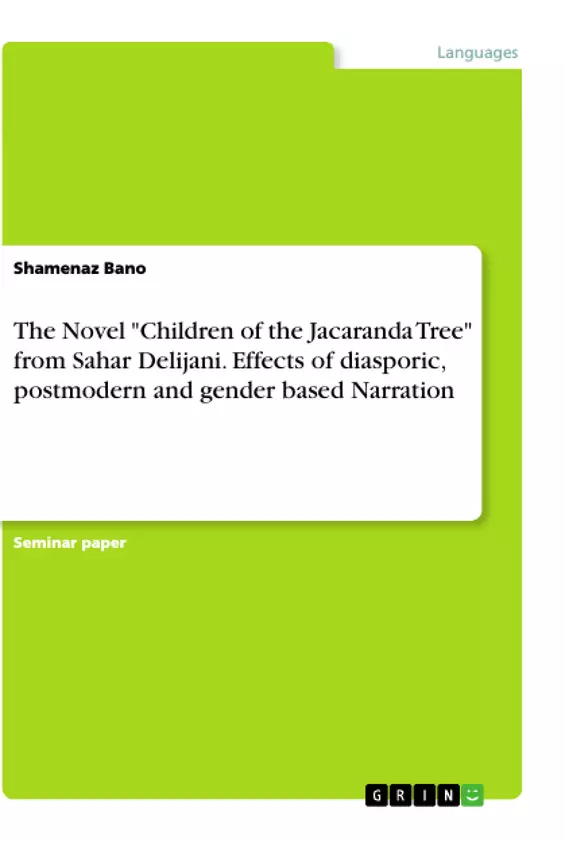The paper analyzises the effects of diasporic, postmodern and gender based voice in the novel "Children of the Jacaranda Tree" from Sahar Delijani. Sahar Delijani an Iranian author whose debut novel, Children of the Jacaranda Tree, is a novel which reflects a female writer’s voice out of her country which symbolically presents a diasporic, gender based voice. This voice has been raised out of her homeland (abroad, in USA and Italy) and tries to reflect her voice in her second language with a globalized view based on her natural feminist and cultural background. Her novel is a political protest but here we just want to analyze the effect of its diasporic, postmodern and gender based narration of globalized world of literature.
In spite of a rich trove of classical works (mainly poems), modern Iranian literature is less than a hundred years old. If we consider the works of Sadegh Hedayat (1903-1951) in fiction and Nima Yushij (1895-1960) in poetry as the beginning of Iran's modern literature, then we can discern two influential factors in its development. First, there is a certain level of familiarity and interaction with the latest intellectual trends and literary achievements of the West. Second, a political openness at home, which brings about a suitable atmosphere for exchange of ideas and publication of new voices.
Inhaltsverzeichnis (Table of Contents)
- Globalized Gendered Based Diaspora of Postmodern Iranian Novels: Case Study of Sahar Delijani's Children of the Jacaranda Tree
- Introduction
- Iranian Literature and Its Development
- Sahar Delijani's Children of the Jacaranda Tree
- The Diaspora of Iranian Literature
- The Notion of Exile
- Shifting Towards Diaspora
- Diaspora and Postmodern Literature
- Conclusion
Zielsetzung und Themenschwerpunkte (Objectives and Key Themes)
This article examines the globalized, gender-based diaspora of postmodern Iranian novels, using Sahar Delijani's Children of the Jacaranda Tree as a case study. It aims to analyze the novel's diasporic, postmodern, and gender-based narrative within the context of global literature.
- The impact of diaspora on Iranian literature
- The influence of postmodernism on Iranian novels
- The representation of gender in Iranian literature
- The role of symbolism in Iranian literature
- The cultural and political context of Iranian literature
Zusammenfassung der Kapitel (Chapter Summaries)
The article begins by introducing the history of Iranian literature and its development, highlighting the influence of Western intellectual trends and political openness in its evolution. It then focuses on Sahar Delijani's Children of the Jacaranda Tree, examining its diasporic, postmodern, and gender-based narrative. The author discusses the novel's symbolic elements, including the title, character names, and nostalgic elements, which represent the author's delicate feelings towards her lost homeland. The chapter then delves into the concept of diaspora in Iranian literature, examining Edward Said's notion of exile and its limitations, and highlighting the shift from exile to diaspora in recent scholarship.
Schlüsselwörter (Keywords)
The key terms and concepts explored in this article include postmodern Iranian novels, diaspora, gender, exile, symbolism, Iranian literature, globalized literature, cultural identity, and feminist perspective.
Frequently Asked Questions
What is the novel "Children of the Jacaranda Tree" about?
It is the debut novel by Sahar Delijani, reflecting on the political struggles in Iran and the lives of those affected by the revolution, told through a diasporic and gender-based lens.
Who is Sahar Delijani?
Sahar Delijani is an Iranian author who lives in the USA and Italy. Her work is a form of political protest written in her second language with a globalized perspective.
What does the term "Diaspora" mean in Iranian literature?
It refers to the literature created by Iranian authors living outside their homeland, reflecting themes of displacement, nostalgia, and cultural identity from a distance.
How is postmodernism reflected in the novel?
The novel uses postmodern narrative techniques such as shifting perspectives, fragmentation, and symbolic elements like the jacaranda tree to represent complex cultural memories.
What is the role of gender in Delijani's narration?
The narration is deeply influenced by a feminist and cultural background, giving a specific voice to female experiences within the context of exile and political upheaval.
What is the difference between "Exile" and "Diaspora"?
While "exile" often implies a forced and painful separation with a focus on the lost home, "diaspora" suggests a more permanent, globalized community identity with a hybrid cultural view.
- Arbeit zitieren
- Dr Shamenaz Bano (Autor:in), 2020, The Novel "Children of the Jacaranda Tree" from Sahar Delijani. Effects of diasporic, postmodern and gender based Narration, München, GRIN Verlag, https://www.grin.com/document/948947



